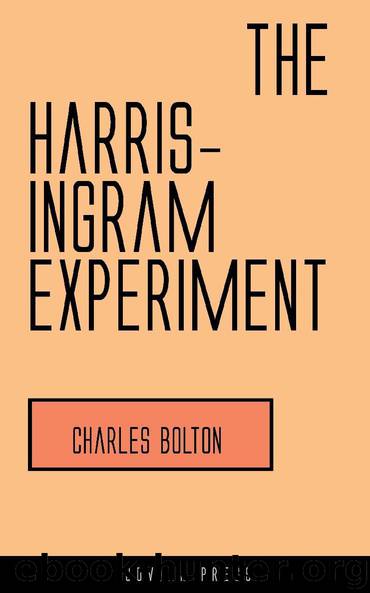The Harris-Ingram Experiment by Charles Bolton

Author:Charles Bolton
Language: eng
Format: epub
Publisher: Jovian Press
* * *
CHAPTER XV
~
A SAFE PASSAGE AND A HAPPY REUNION
GERTRUDE AND MAY NEVER KNEW what happiness was before. One maiden had her lover, and the heart of the other was pledged to music. George too was happy in Gertrude’s happiness and joyous in his own thoughts that perhaps he had already entered upon his life work, the development of plans which would bless humanity. Colonel Harris’s chief joy was that he had earned a rest, was soon to see the absent members of his family, and to behold the work of men in Europe.
People crowded the gangway, the same as on a previous occasion when duty forced him suddenly to leave the “Majestic.” It was almost two o’clock; visitors were no longer admitted to the steamer, except messengers with belated telegrams, mail, packages, and flowers for the travelers. On the bridge of the “Campania” stood the uniformed captain and junior officers. The chief officer was at the bow, the second officer aft. The captain, notified that all was ready, gave the command, “Let go!” and the cables were unfastened. The engineer started the baby-engine, which partially opens the great throttle-valves, the twin-screws began to revolve, and the “Campania,” like an awakened leviathan slowly moved into the Hudson River. Hundreds on both the pier and steamer fluttered their handkerchiefs, and through a mist of tears good-byes were exchanged, till the increasing distance separated the dearest of friends.
For twenty-four hours George Ingram was seen but little on deck. Most of his time he spent with Carl Siemen, the engineer. The colonel took great delight as the escort of two appreciative young ladies. Before the voyage ended every available part of the “Campania” was explored.
Gertrude was surprised to find an engineer so cultivated a gentleman. He was surrounded in his oak-furnished office by soft couches, easy chairs, works of art, burnished indicators and dials. Mr. Siemen received his orders from the captain or officer on the bridge by telegraph.
“It’s mere child’s play,” said May, “and as easy as touching the keys of a great organ.”
Mr. Siemen now conducted his friends into the engine-room. “It is not easy to imagine the tremendous force of the two swiftly turning screws or propellers exerted against the surging waters of the Atlantic,” he said. “Our 30,000 horse power engines, a horse power is equal to six men, equal 180,000 strong men pulling at the oars, or twice the number of men that fought at Gettysburg to perpetuate the American Union.”
“Wonderful!” said Colonel Harris.
“Steam guided by command of the officer on the bridge, with slightest effort, also steers our immense steamer.”
“Mr. Siemen, tell us please how the steamer is lighted?” said George.
“We have fifty miles of insulated wire in the “Campania” for the electric current generated by our two dynamos, which give us 1350 sixteen-candle power lights, equal to a total of 22,000 candle power, absorbing 135 horse-power. We also use large electric reflectors and search lights to pick up buoys on a dark night. All our machinery is in duplicate.
Download
This site does not store any files on its server. We only index and link to content provided by other sites. Please contact the content providers to delete copyright contents if any and email us, we'll remove relevant links or contents immediately.
Hit Refresh by Satya Nadella(9138)
When Breath Becomes Air by Paul Kalanithi(8447)
The Girl Without a Voice by Casey Watson(7889)
A Court of Wings and Ruin by Sarah J. Maas(7847)
Do No Harm Stories of Life, Death and Brain Surgery by Henry Marsh(6941)
Shoe Dog by Phil Knight(5269)
The Rules Do Not Apply by Ariel Levy(4970)
A Higher Loyalty: Truth, Lies, and Leadership by James Comey(4964)
Hunger by Roxane Gay(4928)
Tuesdays with Morrie by Mitch Albom(4784)
Everything Happens for a Reason by Kate Bowler(4743)
The Immortal Life of Henrietta Lacks by Rebecca Skloot(4588)
Millionaire: The Philanderer, Gambler, and Duelist Who Invented Modern Finance by Janet Gleeson(4478)
How to Change Your Mind by Michael Pollan(4357)
All Creatures Great and Small by James Herriot(4322)
The Money Culture by Michael Lewis(4207)
Man and His Symbols by Carl Gustav Jung(4137)
Elon Musk by Ashlee Vance(4128)
Tokyo Vice: An American Reporter on the Police Beat in Japan by Jake Adelstein(3996)
